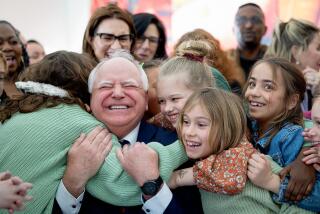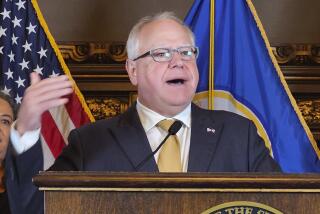The Drive to the Center
- Share via
It’s a muggy August night in Philadelphia and the Republican National Convention erupts in cheers as Arizona Sen. John McCain is nominated by acclamation to be George W. Bush’s vice presidential running mate. That may seem impossible now, considering their animosity for each other just a few days ago. But it’s something Bush may need to consider as he tries to steer his campaign back toward the political center, where presidential elections are won or lost.
McCain has said he would not be a No. 2. But it hasn’t been uncommon for bitter foes to join forces for the good of their parties: John F. Kennedy and Lyndon B. Johnson, for instance, or Ronald Reagan and George Bush.
Running with George W. may be the last thing on McCain’s mind as he ponders his political future. On Thursday, he suspended his campaign and wished Bush well. But pointedly, he withheld his endorsement. Politicos wondered how McCain might use his considerable leverage to make the Republican Party the inclusionary body that Bush claims to want. McCain should pursue such a course, and the party should welcome his help.
Also Thursday, former New Jersey Sen. Bill Bradley gave up his campaign for the Democratic nomination and said he will support Vice President Al Gore. Bradley also promised to press his own reform cause, but he had failed to win a primary and has little leverage.
History offers McCain several options in the coming weeks. He could run as an independent or at the head of the Reform Party, but he would probably lose and hand the election to Gore in the process. Republicans would remember McCain not as a popular, charismatic hero but as a self-indulgent spoiler who cost them the White House in 2000.
McCain could return to Washington and resume, with new vigor and authority, his assaults on the corrupting role that special-interest money plays in politics and government. But that course could cause him to be branded as a scold. Or he could set aside the rhetoric and try to persuade Bush to support a real overhaul of campaign finance and a more realistic approach to changes in the tax system and Social Security. At the core, McCain and Bush are conservatives who agree on most basic issues.
Bush, in turn, might tell McCain that the only way the GOP could win would be for McCain to join the ticket, to give the Bush campaign the breadth it needs. Bush could appeal to McCain’s sense of duty by saying it’s the best way the senator could serve both party and country. This is courtship as old as the American political system. Could or would McCain resist?
While Super Tuesday is fresh in mind, we urge the major parties to move quickly to restructure the primary system along some rational lines. They should look seriously at the plan of the secretaries of state, led by California’s Bill Jones, to hold four or five rotating regional primaries between February and June in the next presidential election cycle.
The extreme front-loading of the primary season this year, including California’s earliest primary ever, gave the electorate a nominating season that lasted just 35 days, from New Hampshire to Super Tuesday. This system virtually guarantees victory for establishment candidates and shuts out insurgents, even those of such quality and ability as John McCain and Bill Bradley. That does not serve the country well.
More to Read
Get the L.A. Times Politics newsletter
Deeply reported insights into legislation, politics and policy from Sacramento, Washington and beyond. In your inbox twice per week.
You may occasionally receive promotional content from the Los Angeles Times.










